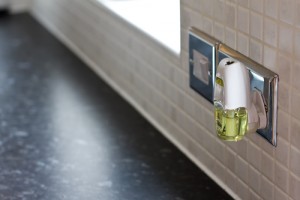 It may sound strange to say this, but allergic reactions, such as breaking out into hives, getting headaches, and developing bronchial issues at the threat of detergents, perfumes, dyes and harsh air pollutants is an early warning of a problem that must be immediately corrected. Many times, the problem occurs inside our homes and workplaces. We wanted to share some information on common household chemicals that may or may not cause an allergic reaction. These chemical exposures, even to something as simple as a plug-in air freshener, may contribute to long-term health issues without us ever knowing it.
It may sound strange to say this, but allergic reactions, such as breaking out into hives, getting headaches, and developing bronchial issues at the threat of detergents, perfumes, dyes and harsh air pollutants is an early warning of a problem that must be immediately corrected. Many times, the problem occurs inside our homes and workplaces. We wanted to share some information on common household chemicals that may or may not cause an allergic reaction. These chemical exposures, even to something as simple as a plug-in air freshener, may contribute to long-term health issues without us ever knowing it.
Household Toxins
Hippocrates Health Institute’s newsletter recently presented an article entitled, Guarding Yourself From Chemicals, written by Tina Discepola, MD. Among Dr. Discepola’s “ingredients-to-avoid” are Bisphenol A (BPA; found in canned foods, receipts and thermal papers), PVC and Vinyl (often found in soft plastic toys and shower curtains), Triclosan (found in antibacterial soaps), Parabens (found in shampoos and lotions), and Phthalates (found in perfumes). Dr. Discepola also recommends that plug-in air fragrances should be avoided both at home and work.
Yes, even the seemingly harmless plug-in air freshener, which gives your house a pleasant floral scent, may expose your family to airborne phthalates known to wreak havoc on hormones, cause asthmatic attacks, and possible birth defects. Before tossing out the “plug-ins,” we found this handy guide on the Natural Resources Defense Council’s website identifying the amount of phthalates detected in the various plug-in air fresheners on the market. There are options available on the market with either trace or no phthalates detected (such as Citrus Magic containing essential oils and at least one Febreeze product).
How to Guard Against Toxins in the Household and Workplace
Some of the recommendations provided by Dr. Discepola in her article include: Avoiding chemical pesticides and plastics – particularly those labeled No 3, 6 or 7. (Note: AquaNew uses No. 1 plastic bottles); if you use plastic, never use it to heat food in the microwave or place it in the dishwasher; and choose household products that don’t come with CAUTION, DANGER or CAUSTIC warning labels.
On the last recommendation above, AquaNew shares some easy tips to reduce toxic exposure when using cleansers:
- Use Polarized Water (Watt-Ahh®) to dilute cleaning solutions. A 10 to 1 ratio of Polarized Water to a cleanser should do the trick.
- Add a low concentration of hydrogen peroxide to Polarized Water for nature-based sanitation of counter surfaces.
- Clean eyeglasses by lightly spraying with Polarized Water (chemical free) and wipe with a clean cloth.
